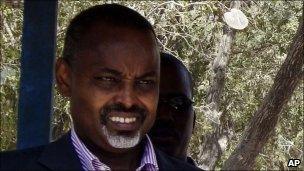Mogadishu mayor: 'I may be killed'
- Published

Mayor Noor left his family behind in London in order to take on his role
Mohamed Ahmed Noor was under no illusions when he agreed to take on the job of mayor of Mogadishu, capital of Somalia.
He was living in the relative safety of London when the offer was recently made. He sat his family down and told them he may not be coming back.
"I explained the dangers of the job, that I may be killed and that one day they may hear on the news that the mayor of Mogadishu has been assassinated, or killed in an explosion."
Mayor Noor says his family were very supportive, though they still did not agree it was a risk worth taking.
"I insisted, I said if I do not take this job no-one else will take it. I have to do it," he told the Βι¶ΉΤΌΕΔ World Service.
Why is he so passionate about Mogadishu, a city regularly described as the most dangerous in the world?
"Mogadishu is the city I was born in, it's the city I grew up in.
"I love the city and its people very much and every time I see the situation in the city it makes me sad. I feel that I must change something, or contribute to improve the lives of the population."
Misunderstanding
Despite the fact that Somalia has experienced almost constant conflict since the collapse of its central government in 1991, and that the hardline Islamist al-Shabab militia controls significant sections of the capital, Mayor Noor feels that Mogadishu gets a bad press.
"I think there is a misunderstanding about Mogadishu. It is not more dangerous than Baghdad, or Kabul.
"If you compare death rates, or daily accidents in the capitals, on a bad day in Mogadishu you can have 10-20 deaths, but in Baghdad we hear of 50 or 100 casualties in a day. In Kabul it can be more than that."
Clean markets are one of Mayor Noor's priorities
Mr Noor does recognise the limitations the security situation presents, however.
"I cannot work effectively, I cannot go wherever I want, I don't have resources to provide services."
But since taking office four months ago, he says he has tried to do whatever he can to improve the lives of Mogadishu's people.
"I am lighting the streets of Mogadishu so people can start to lead a normal life.
"I am cleaning the streets, the markets. All that is an improvement," he said.
'So be it'
Mayor Noor acknowledges that part of the reason why Mogadishu is able to function in any way is the presence of the 8,000 African Union troops who are backing the fragile interim government in its fight against al-Shabab.
"Without the AU's Somali mission, , the airport and sea port wouldn't function, which would be very bad for the city."
However, he does not agree with everything they do.
"The bombardment and the civilian casualties - we don't agree with that, and we don't welcome that, but the reality is that this government cannot exist without them."
Mr Noor says he would welcome more, rather than less outside help.
"If you look at Sierra Leone, for example, British soldiers gave their lives to bring back the stability in the country. In Liberia, the same thing happened. "
But, he says, the international community seems to have deserted Somalia.
"They have not only deserted Somalia but some of them are interfering. They don't want a real settlement.
"Somalia right now is in a coma, it's like a person in an operating theatre, unconscious - anyone can come in and do whatever they want".
Despite the challenges, Mayor Noor is not overwhelmed.
He even says he is prepared to make the ultimate sacrifice.
"If I can improve the lives of the people of Mogadishu, and it costs my life, so be it".